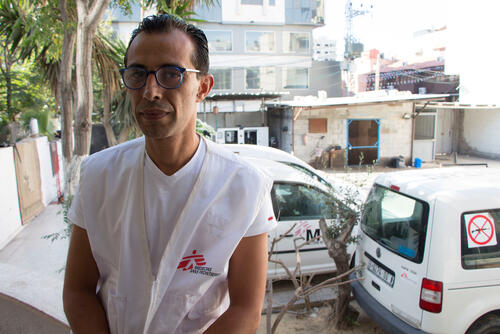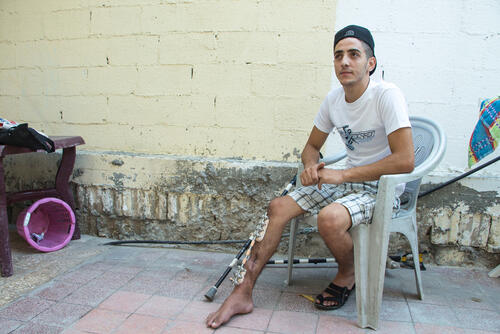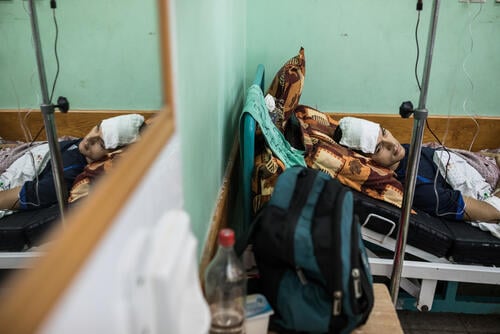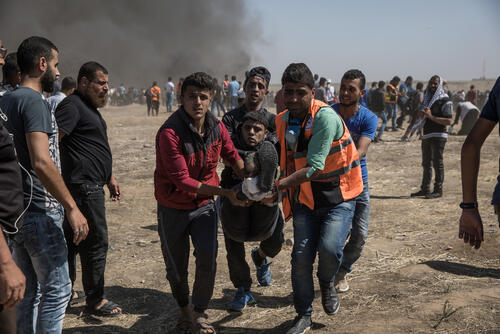Dr Mohammed Abu Mughaiseeb has been treating people in the Great March of Return protests in Gaza, Palestine, over the last six months. He describes the influx of people, mainly young men, whose bones - and lives - have been shattered, and the difficulty of providing the right treatment in a blockaded enclave.
The last six months have been the most difficult I have experienced in my 15 years with MSF in Gaza. And that’s compared to the wars of 2008, 2012 and 2014.
For me, a doctor from Gaza, living and working here all my life, I feel like I know our limits in terms of what Gaza can endure. It’s been unbelievably difficult to tolerate the shocking volume of wounded arriving from the fence these last months.
I will never forget Monday 14 May. The local health authorities recorded a total of 2,271 wounded in one day. This included 1,359 people injured by live ammunition.
I was with our surgical team at al-Aqsa hospital, one of the main hospitals in Gaza. At 3pm we started to see an influx of patients coming from the demonstration. More than 300 wounded arrived though the doors in less than four hours.
I had never seen so many patients in my life; patients queuing to get into the operating theatre. The corridors were full; everyone crying, shouting, bleeding.
No matter how hard we worked and how many we were, we could not cope with that many injured bodies. It was too much. Gunshot after gunshot.
Our team worked for 50 hours supporting the Ministry of Health. It brought back the feeling of when we worked through the 2014 war. But really, nothing can prepare you for this.
What are we seeing today?
Still, each week new trauma cases arrive. The majority are young men with gunshot wounds in their legs with the potential to cause life-changing disabilities.
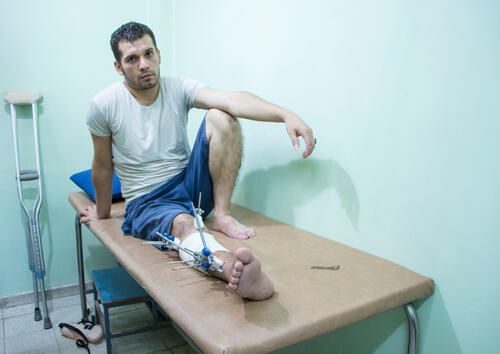
The medical structures in Gaza are crumbling under the demand and ongoing shortages. MSF’s cohort of patients continues to grow and equates to about 40 per cent of the total gunshot wounded in Gaza, which now totals over 5,000 people.
But the more we advance in treating these gunshot injuries, the more we see the complexity of what has to be done. It’s difficult, medically and logistically.
A large proportion of MSF patients need specialised limb reconstructive surgical intervention, which means multiple surgeries for some patients, but the procedures are not currently possible in Gaza.
What terrifies me the most is the risk of infection.Dr Mohammed Abu Mughaiseeb, MSF medical referent in Gaza
Osteomyelitis is a deep infection of the bone. If it goes untreated, it can lead to non-healing wounds and increase the risk of amputation. And as time goes on, it gets worse. These infections need to be treated as soon as possible.
It’s terrifying to think they could lead to amputation for these young men. But the infection is not easy to diagnose and there is currently no structure in Gaza for analysing bone samples to identify it.
MSF is working to set up a microbiology laboratory here, providing supplies and training, in order to be able to test bone samples for osteomyelitis. But even then, once we are able to identify the infection, treatment requires a long and complex course of antibiotic treatment for each patient and repeated surgical intervention.
I move all over the Gaza strip and I see young men everywhere on crutches with external fixators on their legs, or in wheelchairs. It’s becoming a normal sight. And so often they’re smiling and enduring life with their injury. But for me, as a doctor, I know the long-term prognoses are bleak.
To talk to a patient, a young man, knowing that he could lose his leg a result of a bullet that has shattered his bone and his future, and to have him ask me ‘Will I walk freely again?’... This is very hard. Because I know, medically, due to the situation we are working in, he will struggle to walk again.
I have to pass the message that we will do our best, but the risks are high and there is a risk of him losing his leg. To tell this to a young man with his life ahead of him, that is very difficult. And it’s not just one patient – it’s a conversation we have to have many times with many patients.
It’s a question of medical ethics. These injured people must get the treatment they need.Dr Mohammed Abu Mughaiseeb, MSF medical referent in Gaza
Of course, we continue to try to find a way to treat these people within the limitations we face: overwhelmed hospitals and, because of the blockade, four hours of electricity a day, fuel shortages, depleted medical supplies, a lack of specialist surgeons and doctors, exhausted nurses and medics running the hospitals and not being paid their full salaries for months on end, restrictions on patients leaving Gaza to receive medical treatment elsewhere... The list goes on.
And all around us we see the daily deterioration of Gaza. The social and economic situation has plummeted. Now you see children begging on the street; we didn’t see that a year or two ago.
MSF has a huge mountain to climb, and we cannot do it alone. We try. We push. We have to keep going. For us, it’s a question of medical ethics. These injured people must get the treatment they need.
But from where I am standing, looking into the future is like looking into a dark tunnel. And the light at the end of the tunnel...I’m not sure it is there. It keeps flickering on and off.”



